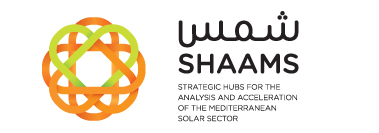Under the patronage of His Excellency, the Minister of Industry, Trade and Supply, Al Urdonia Lil Ebda and in cooperation with the Jordanian Engineers Association, Jordanian institutions and regional governmental and non-governmental organizations in the framework of SHAAMS program funded by the European Union, ENPI CBC Med cross-border cooperation in the Mediterranean held a workshop entitled “The Future of green technology in Jordan and regional best practices ” on Tuesday, May 5th 2015.
The opening of the workshop was a was welcome speech from the representative of the Minister of Industry and Trade acting Secretary-General Engineer Ramzi Al-Shaweesh, Jordanian Engineers Association, Engineer Abdullah Obeidat, Engineer Mohammad Abu Afifah Chairman of Al Urdonia Lil Ebda Board Director and Engineer Mohammad Al Amoush The Chief Executive Director of Al Urdonia Lil Ebda.
The representative of His Excellency, the Minister of Industry and Trade, stated in his speech that energy is a key factor and a management component in the development of economic policies that is a challenge in the pace of economic growth, which makes the search for alternative sources and diverse energy inevitable, particularly in countries that suffer from a scarcity of energy resources. Jordan with guidance from His Majesty King Abdullah II (may God protect him and take care of him) works on the provision of alternative sources of energy, which would help it overcome economic challenges associated with energy, especially solar energy and wind power generation. It also indicated that the non-oil producing country Jordan imports about 96 % of its energy from abroad, which raises production costs to local factories and weaken its competitiveness, which makes the search for alternative sources of energy an essential to enhance the competitive industries and the volume of their exports.
Engineer Abdullah Obeidat confirmed that Jordan is one of the countries with limited resources in the energy sector, as it depends on large imports to cover its needs in the field of energy, which constitutes a strong motive to find alternative sources of energy that dependent on natural resources and reduce economic burden on Jordan.
Obeidat also stressed about the need to support business leadership in the energy sector, and that the Engineers Association will give the energy sector more attention by providing all possible support to all the entrepreneurs that work in the field of energy through companies which work on leadership support, including Al Urdonia Lil Ebda.
The Chairman of Al Urdonia Lil Ebda Board Director, Engineer Mohammad Abu afifeh, in his speech mentioned the importance of holding the workshop and that it effectively establishes the principle of cooperation, consultation and coordination between all the governmental institutions in the renewable energy sector and green energy, also the private sector, research institutions, donors, and civil society, and the fact that these effectively translate the concept of regional cooperation between the countries of the Mediterranean basin.
He also mentioned the commitment of Al Urdonia Lil Ebda – which is a company owned by governmental and non-governmental institutions are: Jordan Enterprise Development Corporation, Jordan Industrial Estates Company and The Jordan Engineers Association- and its incubation services and it’s continuous support for entrepreneurs in governorates and offering all the technical support that contributes in creating projects in the area of green energy and technology.
The company’s Chief Executive Director Engineer Mohammad asserted on the importance of the workshop as it’s covering a range of topics relating to the energy sector such as the challenges facing the private sector, the management of the private sector, local and regional best practices, and the role of research institutions in the solution of problems relating to this sector.
Eng. Al Amoush also urged that the importance of this workshop lies in the number of local experts and the countries of the region and to contribute to the exchange of expertise and experience. He also mentioned that the energy sector is one of the most important sectors vital to have a great impact on the economies. And he pointed out that in his point of view the problem of this sector could not be resolved completely without regional cooperation in the field of energy, through the exchange of resources, expertise, research, and best practices.
It is worthy to mention that the number of participants in the workshop exceeded 200 experts in the field of energy and green zone technology from Spain, Italy, France, Greece, Egypt, Lebanon and Jordan. The Workshop aimed to discuss policies on the energy sector, the challenges facing the energy sector, the energy sector in Jordan, technology and applications used in the renewable energy sector, best practices and the role of regional research institutions and universities in the renewable energy sector.
The proceedings of the workshop was of three discussion sessions , the first session entitled ” green technology policies in Jordan” which included the energy sector policies in Jordan and challenges facing the sector and how to manage the energy sector and the best practices in renewable energy sector.
The second session was a round-table discussion on the report of the energy sector in Jordan, which had been prepared by local and international experts on the energy situation in Jordan and the current practices used.
The workshop was held in parallel with another networking workshop among the participants of the public sector, private sector, and research institutions from Jordan and participating countries, as bilateral meetings had been arranged to discuss the challenges facing the energy sector and ways to overcome them, and to discuss areas of cooperation between these actors in the field of green technology solar energy.
The third and final session was entitled “Financing of energy sector projects,” which was about the reality of the financing of energy projects and mechanisms and methodologies for financing energy projects and best practices in this area.
-
Recent Posts
- Jordan shine a light on the climate action
- The II Mediterranean Solar Forum Video
- SHAAMS Celebrates 3 years of success-Warm Wishes
- SHAAMS Final Event-Celebrating Achievements at the 2nd Mediterranean Solar Forum
- The European Union supports with more than 25 million Euros projects to promote solar energy in the Mediterranean region







